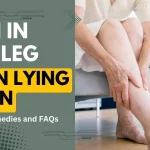Restless Leg Syndrome (RLS) is a neurological disorder with an irresistible urge to move the legs, accompanied by unpleasant sensations. Restless Leg Syndrome can disturb sleep, affect emotional well-being and significantly impact the overall quality of life. While there is no cure for RLS, certain vitamins can play a role in managing the symptoms and promoting better sleep. This article will explore what vitamins help restless leg syndrome and discuss their importance in alleviating the condition.
Restless Leg Syndrome is a widespread condition that impacts millions of people globally. It is often described as a tingling, itching or crawling sensation in the legs, typically experienced during rest or inactivity. These uncomfortable sensations can lead to an uncontrollable urge to move the legs, providing temporary relief.
Understanding Restless Leg Syndrome

What is Restless Leg Syndrome?
Restless Leg Syndrome, also known as Willis-Ekbom disease, is a neurological disorder primarily affecting the legs. While the precise cause of Restless Leg Syndrome (RLS) is unknown, it is widely believed to result from genetic and environmental factors.
Causes of Restless Leg Syndrome
Several factors can contribute to the development of Restless Leg Syndrome. These factors encompass genetic predisposition, iron deficiency, specific medical conditions like kidney failure and diabetes, pregnancy and certain medications.
Symptoms of Restless Leg Syndrome
The primary symptom of Restless Leg Syndrome is an overwhelming urge to move the legs, typically accompanied by uncomfortable sensations. The severity of symptoms can vary from mild to severe and can worsen during inactivity or at night.
Prevalence and Risk Factors
Restless Leg Syndrome affects approximately 5-15% of the population, with women being more commonly affected than men. Several risk factors, including family history, age and chronic conditions, can raise the chances of developing RLS.
Impact of Restless Leg Syndrome
Restless Leg Syndrome can significantly impact various aspects of a person’s life.
Sleep Disruption and Fatigue
The uncomfortable sensations and urge to move the legs can significantly disrupt sleep, leading to insomnia and daytime fatigue. Lack of quality sleep can affect overall well-being and cognitive function.
Emotional and Mental Health
Living with Restless Leg Syndrome can be emotionally challenging. The sleep disturbances, discomfort and frustration associated with the condition can increase stress, anxiety and depression.
Effect on Quality of Life
The symptoms of Restless Leg Syndrome can interfere with daily activities, work productivity, and social interactions. The constant need to move the legs can be disruptive and limit a person’s ability to sit or relax for extended periods.
Importance of Vitamins for Restless Leg Syndrome
Certain vitamins play a crucial role in managing the symptoms of Restless Leg Syndrome and promoting better sleep.
Vitamin D
Vitamin D deficiency has been associated with increased symptoms of RLS. Adequate levels of vitamin D help regulate dopamine levels in the brain, which can positively affect the symptoms of RLS.
Iron
Iron deficiency has been strongly linked to Restless Leg Syndrome. Iron plays a vital role in dopamine production, and low iron levels can lead to an imbalance of dopamine, contributing to RLS symptoms. Supplementation or dietary changes to increase iron intake may help alleviate symptoms.
Magnesium
Magnesium deficiency is associated with muscle cramps and spasms, common in Restless Leg Syndrome. Magnesium supplementation may help relax the muscles and reduce the intensity of RLS symptoms.
Vitamin B12
Vitamin B12 is essential for maintaining healthy nerve function. Deficiency in vitamin B12 can lead to nerve damage and worsen the symptoms of Restless Leg Syndrome. Ensuring an adequate intake of vitamin B12 may help manage RLS symptoms.
Vitamin E
Vitamin E, an antioxidant, can aid in safeguarding nerves and enhancing blood circulation. It may play a role in reducing inflammation and improving symptoms in individuals with Restless Leg Syndrome.
Sources of Vitamins
Both food sources and supplements can provide the necessary vitamins to support the management of Restless Leg Syndrome.
Food Sources
- Vitamin D: Fatty fish (salmon, mackerel), fortified dairy products, egg yolks.
- Iron: Red meat, poultry, seafood, beans, dark leafy greens.
- Magnesium: Nuts, seeds, legumes, whole grains, leafy greens, dark chocolate.
- Vitamin B12: Meat, fish, poultry, dairy products, fortified cereals.
- Vitamin E: Nuts and seeds, spinach, broccoli, avocado, vegetable oils.
Supplements
If dietary intake alone is insufficient, supplements can be considered under the guidance of a healthcare professional. It is important to ensure proper dosage and avoid excessive supplementation.
Dietary Recommendations for Restless Leg Syndrome
In addition to focusing on specific vitamins, a healthy and balanced diet can contribute to managing Restless Leg Syndrome. Including foods rich in vitamins, minerals and antioxidants can support overall health and potentially alleviate symptoms.
Lifestyle Changes
In addition to incorporating vitamins into your routine, making certain lifestyle changes can greatly contribute to managing Restless Leg Syndrome (RLS) and reducing its impact on your daily life. Here are some lifestyle modifications you can consider:
Regular Exercise
Engaging in regular physical activity can help alleviate the symptoms of RLS. Exercise promotes better blood circulation, releases endorphins and improves sleep quality. Make it a target to participate in moderate-intensity exercises like brisk walking or cycling for at least 30 minutes on most days of the week.
Establish a Relaxation Routine
Engaging in relaxation techniques before bedtime can assist in calming your mind and preparing your body for restful sleep. Consider incorporating activities such as deep breathing exercises, meditation, gentle stretching or taking a warm bath into your evening routine.
Avoid Triggers
Identify and avoid triggers that worsen your RLS symptoms. These may include certain medications, caffeine, alcohol and tobacco. Take note of how your body reacts to various substances and activities and make appropriate adjustments based on your observations.
Maintain a Regular Sleep Schedule
A consistent sleep schedule can regulate your body’s internal clock and promote better sleep quality. Aim to go to bed and wake up simultaneously each day, even on weekends. Creating a relaxing sleep environment with dim lighting, comfortable bedding and a cool room temperature can also promote better sleep.
Massage and Stretching
Gently massaging and stretching your legs can provide temporary relief from RLS symptoms. Consider incorporating these practices into your bedtime routine or whenever you experience discomfort. You can gently massage and stretch the muscles in your legs with a foam roller, tennis ball or your hands.
Stress Management
Stress can exacerbate RLS symptoms, so finding effective ways to manage stress is important. Indulge in activities that help you unwind and find inner peace, such as practicing yoga, enjoying calming music, immersing yourself in a good book or spending quality time in nature. Finding healthy outlets for stress can positively impact your overall well-being.
Maintain a Comfortable Sleep Environment
Create a sleep-friendly environment that promotes relaxation and restful sleep. Ensure your bedroom is dark, quiet and at a comfortable temperature. Use blackout curtains, earplugs or white noise machines to minimize sleep disturbances.
Avoid Prolonged Sitting or Standing
Long periods of sitting or standing can worsen RLS symptoms. If your job or daily activities involve prolonged periods of immobility, try to incorporate regular breaks to stretch, walk around or perform leg exercises. Changing positions and staying active can help reduce the discomfort associated with RLS.
By implementing these lifestyle changes alongside proper nutrition and vitamin intake, you can significantly improve your quality of life and manage the symptoms of Restless Leg Syndrome more effectively.
Other Treatment Options
In addition to vitamins and lifestyle changes, other treatment options for Restless Leg Syndrome include medications, exercise, stress reduction techniques and alternative therapies like massage or acupuncture. Consultation with a healthcare professional is recommended to determine the most suitable treatment approach.
Overall, While Restless Leg Syndrome can be challenging to manage, certain vitamins can play a role in alleviating symptoms and promoting better sleep. Vitamin D, iron, magnesium, vitamin B12 and vitamin E have shown potential benefits in managing Restless Leg Syndrome. It is important to ensure a balanced diet, consider supplementation if necessary and consult a healthcare professional for personalized guidance.
I think you may like it: https://legrestour.com/how-to-stop-restless-legs-immediately-at-home/
FAQs
Can vitamins help with restless leg syndrome?
Vitamins can help manage Restless Leg Syndrome (RLS) by addressing underlying deficiencies that may contribute to symptoms. Certain vitamins such as iron, magnesium, vitamin B12 and vitamin E have been associated with RLS and their supplementation may benefit some individuals. However, it’s important to note that vitamin supplementation should be done under the guidance of a healthcare professional who can assess your specific needs and recommend appropriate doses. More than relying solely on vitamins may be required and a comprehensive approach that includes lifestyle changes and other treatments may be necessary to manage RLS effectively.
What vitamin deficiency causes restless legs?
A specific vitamin deficiency does not directly cause Restless Legs Syndrome (RLS). However, certain vitamins such as iron, magnesium and vitamin B12 have been linked to RLS symptoms. Iron deficiency has been associated with an increased risk of developing RLS. It’s important to consult with a healthcare professional to determine if you have any underlying deficiencies and to discuss appropriate supplementation.
Does vitamin E help restless legs?
Vitamin D may play a role in managing Restless Legs Syndrome (RLS), but its effectiveness must still be fully established. Some studies have suggested a potential association between vitamin D deficiency and RLS symptoms. However, more research is needed to determine the exact relationship and whether vitamin D supplementation can effectively alleviate RLS symptoms. It is recommended to consult with a healthcare professional to assess your vitamin D levels and discuss appropriate supplementation if needed.




1 thought on “What Vitamins Help Restless Leg Syndrome?”